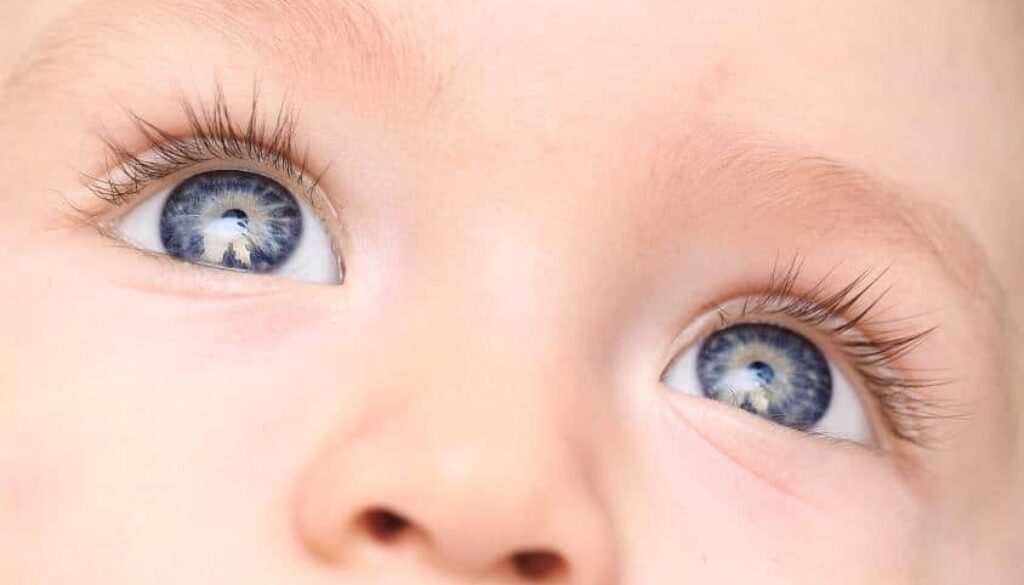Child Eye Health: Essential Tips for Clear Vision & Healthy Eyes
Ensure your child’s lifelong vision health with expert-backed strategies: essential eye exams, screen time limits, nutrition, and injury prevention. Spot early signs to avoid permanent vision issues.
Key Takeaways: How to Protect and Preserve Your Child’s Vision
-
Start Eye Exams Early and Repeat Annually: Schedule checkups at 6 months, 3 years, before school, and then yearly—early detection prevents lifelong vision problems.
-
Limit Screen Time & Near Work: Encourage less than 3 hours of close-up digital use daily, and use the 20-20-20 rule to ease eye strain.
-
Prioritize Outdoor Time: Just 1–2 hours outside daily can slow myopia progression and support overall eye development.
-
Feed Their Eyes Right: A diet rich in vitamins A, C, E, omega-3s, lutein, and zeaxanthin builds strong, resilient eyes.
-
Use Proper Screen and Sleep Habits: Adjust screens ergonomically, use blue light filters, and set a screen curfew to protect sleep and vision.
-
Protect Eyes During Play: Equip kids with sport-specific eyewear and 100% UV-blocking sunglasses during high-risk activities.
-
Know Your Family History: If eye issues run in the family, start screenings earlier and be proactive about early warning signs.
-
Watch for Subtle Vision Clues: Children often won’t complain—look for signs like squinting, eye rubbing, or holding items close.
-
Support Their Confidence: Choose fun eyewear, partner with teachers, and address vision issues early to avoid academic or social setbacks.
How can you help your child have healthy eyes and clear vision?
As parents, we all want the best for our children including clear vision and healthy eyes. Oftentimes in the office, parents ask what they can do at home to help prevent worsening vision.
Regular Eye Exams:
- Yearly exams are necessary to examine the clarity of vision or changes in prescription and the health of the eyes
- Children should have their eyes examined at 6 months, 3 years, and every year afterwards. The most critical time to start annual exams is just before starting schooling at around 5 years old.
Make sure their prescription is up to date
- The wrong prescription or one that is too weak can not only cause blurry vision and eye strain but can contribute to the prescription worsening faster or potentially permanently reducing best-corrected vision.
Reduce Near Work:
- The amount of work our eyes have to do increases with near objects. The more time spent on computers, tablets, and cell phones causes the eye to elongate and become more myopic (or nearsighted).
- Try to limit near work to less than 3 hours a day
- Take frequent breaks when working on the computer or tablet for many hours. The rule is every 20 minutes, look 20 feet away, and blink for about 2 minutes.
Get Outdoors
- Studies have shown us that not only should children reduce near work, but also spend more time outdoors.
- Children should spend 1-2 hours outside a day
It is important to note that children may not have complaints for a variety of reasons:
- They may not want glasses or think they are “not cool” so they don’t complain
- They may not be aware that what they see is abnormal or that their vision can be clearer
- They may be able to read letters but may not understand that double vision, squinting, or straining their eyes to do so is not normal.
- If they see well out of one eye but poorly out of the other eye, their brain may start to suppress the “bad” eye (or shut it off) and only use the good eye to see. This can lead to a “lazy eye” or amblyopia where the poorer eye has permanently reduced vision.
When Should Kids Get Their Eyes Checked?
-
At 6 months: A basic check to ensure proper eye development.
-
At 3 years old: Identifies early signs of amblyopia (lazy eye) and other disorders.
-
Before school (age 5-6): Detects refractive errors (nearsightedness, farsightedness, astigmatism).
-
Every year thereafter: Tracks prescription changes and overall eye health.
Ignoring regular eye exams could lead to permanent vision loss from untreated conditions like lazy eye, strabismus (eye misalignment), or high myopia. Book a yearly eye check-up for your child to stay ahead of vision problems.
Nutrition for Strong, Healthy Eyes
Best Foods for Eye Health
A balanced diet rich in vitamins and antioxidants supports sharp vision and reduces the risk of eye diseases.
-
Vitamin A: Essential for night vision (found in carrots, sweet potatoes, and spinach).
-
Omega-3 fatty acids: Help prevent dry eyes (found in fish, flaxseeds, and walnuts).
-
Vitamin C & E: Protect against cataracts and age-related vision loss (found in citrus fruits, nuts, and seeds).
-
Lutein & Zeaxanthin: Found in eggs and leafy greens, these nutrients reduce blue light damage.
A diet filled with colorful fruits and vegetables ensures your child’s eyes get the nutrients they need to stay strong.
Protecting Eyes During Screen Time: Combatting Digital Eye Strain
How can screen time harm your child’s eyes?
Prolonged exposure to digital devices can lead to digital eye strain, characterized by dry eyes, headaches, and blurred vision. Blue light from screens may also disrupt sleep patterns, worsening eye fatigue.
Actionable Tips to Reduce Screen-Related Eye Strain
- Use blue light filters: Enable built-in device settings (e.g., Night Shift on iOS) or invest in blue light-blocking glasses for kids.
- Adjust screen ergonomics: Position screens 20–24 inches away, slightly below eye level, and reduce glare with matte screen protectors.
- Practice the 20-20-20 rule: Every 20 minutes, encourage your child to look at an object 20 feet away for 20 seconds.
- Limit pre-bedtime screens: Avoid screens 1–2 hours before sleep to improve melatonin production and reduce eye strain.
Sports and Hobbies: Preventing Eye Injuries
Why is protective eyewear critical for active kids?
Eye injuries from sports or hobbies are a leading cause of childhood vision loss. High-risk activities include baseball, basketball, swimming, and science experiments with chemicals.
How to Keep Their Eyes Safe
- Choose sport-specific eyewear: Polycarbonate goggles for swimming or safety glasses for racquet sports.
- Prioritize UV protection: Opt for sunglasses with 100% UV blocking for outdoor activities.
- Emergency response: If debris or chemicals enter the eye, flush with clean water for 15 minutes and seek immediate care.
Genetics and Family History: Are Vision Issues Hereditary?
Can family history affect your child’s eye health?
Conditions like myopia (nearsightedness), strabismus (crossed eyes), and glaucoma often run in families. Early detection through genetic awareness can prevent severe complications.
Proactive Steps for Families with Eye Health History
- Share family history with your eye doctor: Helps tailor screening schedules.
- Schedule earlier exams: Begin annual checks before age 5 if risks are high.
- Monitor closely: Look for signs like squinting or headaches if relatives have vision issues.
Sleep and Eye Health
How does sleep quality impact your child’s vision?
Poor sleep can worsen eye strain and dry eyes, as the eyes repair themselves during rest. Studies suggest inadequate sleep may accelerate myopia progression.
Healthy Sleep Habits for Better Vision
- Set a screen curfew: No devices 1–2 hours before bedtime.
- Use blackout curtains: Promote melatonin production for restorative sleep.
- Encourage consistent bedtimes: Aim for 9–12 hours nightly, depending on age.
Vision Problems and Social-Emotional Well-Being
Can poor vision affect your child’s confidence?
Uncorrected vision issues may lead to academic struggles, social anxiety, or bullying. Kids with “lazy eye” (amblyopia) or glasses may feel self-conscious without proper support.
How to Empower Your Child
- Normalize eyewear: Let them choose fun, colorful frames to boost confidence.
- Collaborate with teachers: Request seating adjustments or larger print materials if needed.
- Address concerns early: Regular exams ensure issues like amblyopia are treated before affecting school performance.
Spotting the Warning Signs of Vision Problems
Many kids don’t realize they have vision issues, so it’s up to parents to watch for signs of trouble.
Common Signs of Eye Problems in Children
-
Frequent squinting or blinking.
-
Tilting their head or covering one eye.
-
Holding books or screens too close.
-
Frequent headaches or eye rubbing.
-
Difficulty concentrating at school.
It is important to have your child’s vision examined regularly, even with no complaints, to monitor for these concerns, worsening prescriptions, lazy eyes, or other visual and ocular health problems. Book your appointment online or call our office to schedule your child’s eye exam.
FAQs
-
Parents in Tamarac, FL, should take their children for regular eye exams starting at 6 months, then at 3 years old, and annually afterward to monitor vision and eye health.




